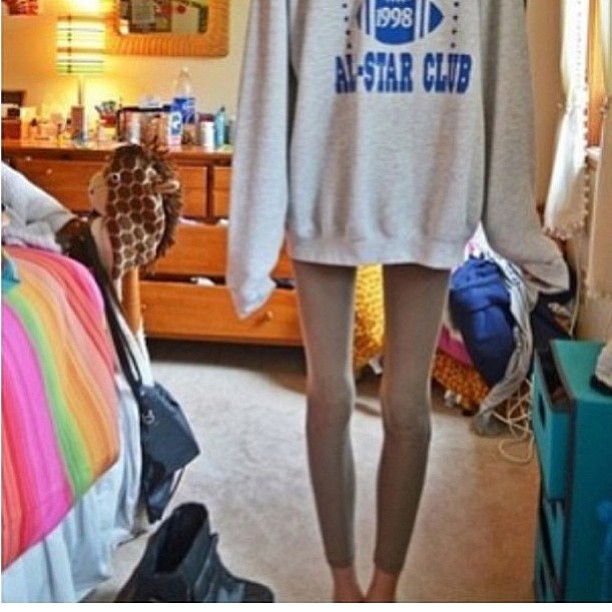The teenage girl was in my office for a routine physical. As we were talking about healthy dietary habits and routine exercise, she blurted it out.
“I make good choices, Dr. Natasha, I’m not like those girls who just want a bigger thigh gap.”
“So, you guys are talking about thigh gaps now?” I asked with horrified curiosity.
“Yeah, mainly the girls in volleyball or cheer. I mean, they have to show their gaps. But, if you go online, you can find exercises to get a gap if you want one.”
I had heard recent murmurings of thigh gapin media outlets, but this was the first time it was mentioned within my office. So, I tried to play it cool. I wanted this beautiful girl to keep talking; to keep explaining who, how, and why this trend is impacting our local high school.
She candidly shared what she had been overhearing in the hallways and reading on smartphones. Girls were trying to achieve a valued “gap” between their thighswhen standing with their ankles touching. For those girls without a gap, they shared diet tips and exercise routines to create one.
After she shared her experience during our private visit, I searched for words to invest a few moments into her self-esteem and self-worth. But, I was breaking inside. As a mom raising a young daughter, I was nauseated with the reality that was being presented.
Fortunately, this young lady understood how this measurement was arbitrary and unrealistic. She proudly told me she was not bothered by such nonsense. I was amazed by her honesty, and shared my agreement and pride with her decision.
Sadly, however, there are many girls who do not share my patient’s body confidence. These girls are desperate for a thigh gap, and connecting with others desiring the same.
With the increase in popularity of Twitter, Tumblr, and other social networks; girls are seeking out validation - anonymous, virtual partners - in this attempt to gain thigh gap. A quick online search reveals an entire community (hashtag) of girls and women who share photos, tips, and “encouragement.” The conversations are brutally cruel, thinly veiled with sadness and self-loathing. Most concerning is their common confessions detailing a coinciding eating disorder, experience of depression, or suicidal thoughts.
As a doctor who cares for growing young women, I can’t help but be concerned for these girls. Through a simple feed of comments and posts, they are revealing mental and physical conditions that meet diagnostic criteria for medical conditions. They are creating a permanent, public record of their damaging experience. Practically, they are giving a warning, a window, or maybe a cry for help to anyone who may be listening.
So what can parents do about threats to a healthy body image?
- Learn how to talk to your child about healthy body image.
KidsHealth has some great online resources to help understand and begin conversations aboutbody image. In addition, The National Eating Disorders Association has a greatlist of 50 thingsyou can do to fight dieting and the drive for thinness.
One obvious challenge with teaching children about healthy body image, however, is a need to have one of our own. If a parent has a history of body image issues or weight concerns, it may be valuable to seek professional advice on how to share these concepts with your children responsibly.
- Know where your kids are online.
For issues that are sensitive, more teens are using the internet for health information. Although most children will turn to the internet for casual curiosities, online patterns of concern can be tracked by a watchful eye. These patterns can reveal things about your child that may threaten their health or safety.
So know who your teen is connecting with online, and what they are searching for. This can be done openly and honestly by having frequent conversations to let them know that devices in your home will be monitored.
- Know the signs of a child with an early eating disorder.
Some girls struggling with body image spiral into a true medical disorder with long term consequences to their mental and physical health. As an observant parent, be aware of some concerning behaviors that may indicate your child needs help. Look at this post from the New York Times discussingearly eating disorder warning signs. Or, watch this video fromDr. David Herzog, an eating disorder specialist at Harvard.
As always, talk to your pediatrician for help if you have worries or concerns. Together, we can build into the young girls in our care, creating places of hope and reassurance throughout the challenges of adolescence.

